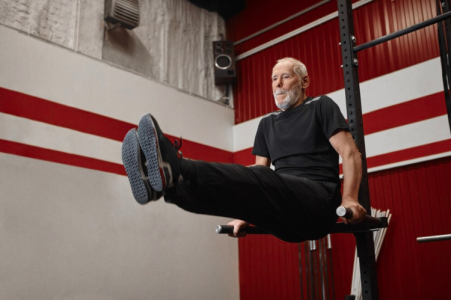Scientists recommend this to avoid Alzheimer's-related death
By
VanessaC
- Replies 3
Disclaimer: This article cannot be considered medical advice. Remember to consult with your doctor first before starting any fitness regimen.
The battle against Alzheimer's disease has been a long and arduous one, with scientists and researchers worldwide striving to find effective ways to prevent, treat, and manage this debilitating condition.
Now, a new study has shed light on a surprising yet accessible method to reduce the risk of death due to Alzheimer's.
The research, conducted by a team of Australian and international scientists, analysed data from a long-term health study in the United States.
The aim was to investigate the correlation between vigorous exercise and the rate of death associated with Alzheimer's disease.
The findings, published in a recent report, suggest that engaging in 20 to 190 minutes of vigorous physical activity (VPA) per week could significantly reduce the risk of death from Alzheimer's.
The study found that the optimal amount of vigorous physical activity was 140 minutes per week, or 20 minutes a day.
This level of exercise could potentially reduce the Alzheimer's-related death rate by a staggering 31 per cent.
However, the key to unlocking these health benefits lies in the intensity of the exercise.
The research also did not find any correlation between moderate physical activity and a reduced risk of Alzheimer's death.
So, what exactly constitutes 'vigorous' physical activity?
According to the researchers, vigorous exercise is any activity that causes heavy perspiration and significant increases in breathing and heart rate.
As for older adults and individuals with limited mobility, the researchers suggested that even short bursts of vigorous exercise could be more beneficial in preventing Alzheimer's-related deaths than longer periods of lighter activity.
'This study is the first to investigate the associations between moderate and vigorous physical activity and Alzheimer's disease-related mortality using a large representative sample of US adults,' the researchers said.
This comes after scientists shared a breakthrough that could change the lives of those with Alzheimer’s disease.
Work is reportedly underway on a new vaccine that could be a key to possibly preventing this devastating disorder.
Researchers at the American Heart Association's Basic Cardiovascular Sciences Scientific Sessions 2023, located in Boston, USA, have presented a gripping study—yet to undergo peer reviewing—showcasing their data.
The vaccine in question provokes interest because it targets inflamed cells within the brain that are associated with Alzheimer's. Just like your white blood cells that seek out infections in your body to battle, this vaccine acts similarly.
You can read more about this scientific breakthrough here.
 Members, what are your thoughts on this discovery? Let us know in the comments below!
Members, what are your thoughts on this discovery? Let us know in the comments below!
The battle against Alzheimer's disease has been a long and arduous one, with scientists and researchers worldwide striving to find effective ways to prevent, treat, and manage this debilitating condition.
Now, a new study has shed light on a surprising yet accessible method to reduce the risk of death due to Alzheimer's.
The research, conducted by a team of Australian and international scientists, analysed data from a long-term health study in the United States.
The aim was to investigate the correlation between vigorous exercise and the rate of death associated with Alzheimer's disease.
The findings, published in a recent report, suggest that engaging in 20 to 190 minutes of vigorous physical activity (VPA) per week could significantly reduce the risk of death from Alzheimer's.
The study found that the optimal amount of vigorous physical activity was 140 minutes per week, or 20 minutes a day.
This level of exercise could potentially reduce the Alzheimer's-related death rate by a staggering 31 per cent.
However, the key to unlocking these health benefits lies in the intensity of the exercise.
The research also did not find any correlation between moderate physical activity and a reduced risk of Alzheimer's death.
So, what exactly constitutes 'vigorous' physical activity?
According to the researchers, vigorous exercise is any activity that causes heavy perspiration and significant increases in breathing and heart rate.
As for older adults and individuals with limited mobility, the researchers suggested that even short bursts of vigorous exercise could be more beneficial in preventing Alzheimer's-related deaths than longer periods of lighter activity.
'This study is the first to investigate the associations between moderate and vigorous physical activity and Alzheimer's disease-related mortality using a large representative sample of US adults,' the researchers said.
This comes after scientists shared a breakthrough that could change the lives of those with Alzheimer’s disease.
Work is reportedly underway on a new vaccine that could be a key to possibly preventing this devastating disorder.
Researchers at the American Heart Association's Basic Cardiovascular Sciences Scientific Sessions 2023, located in Boston, USA, have presented a gripping study—yet to undergo peer reviewing—showcasing their data.
The vaccine in question provokes interest because it targets inflamed cells within the brain that are associated with Alzheimer's. Just like your white blood cells that seek out infections in your body to battle, this vaccine acts similarly.
You can read more about this scientific breakthrough here.
Key Takeaways
- New research has revealed that between 20 to 190 minutes of vigorous physical activity a week can reduce the odds of death due to Alzheimer's disease.
- The optimal amount of exercise to reduce Alzheimer's-related mortality is 140 minutes a week, or 20 minutes a day, which could reduce the death rate from the disease by 31 per cent.
- No correlation was found between moderate physical activity and a reduced risk of death from Alzheimer's.
- The researchers suggest that for older people and those with limited mobility, short amounts of vigorous exercise could be more beneficial than longer, lighter activity.








